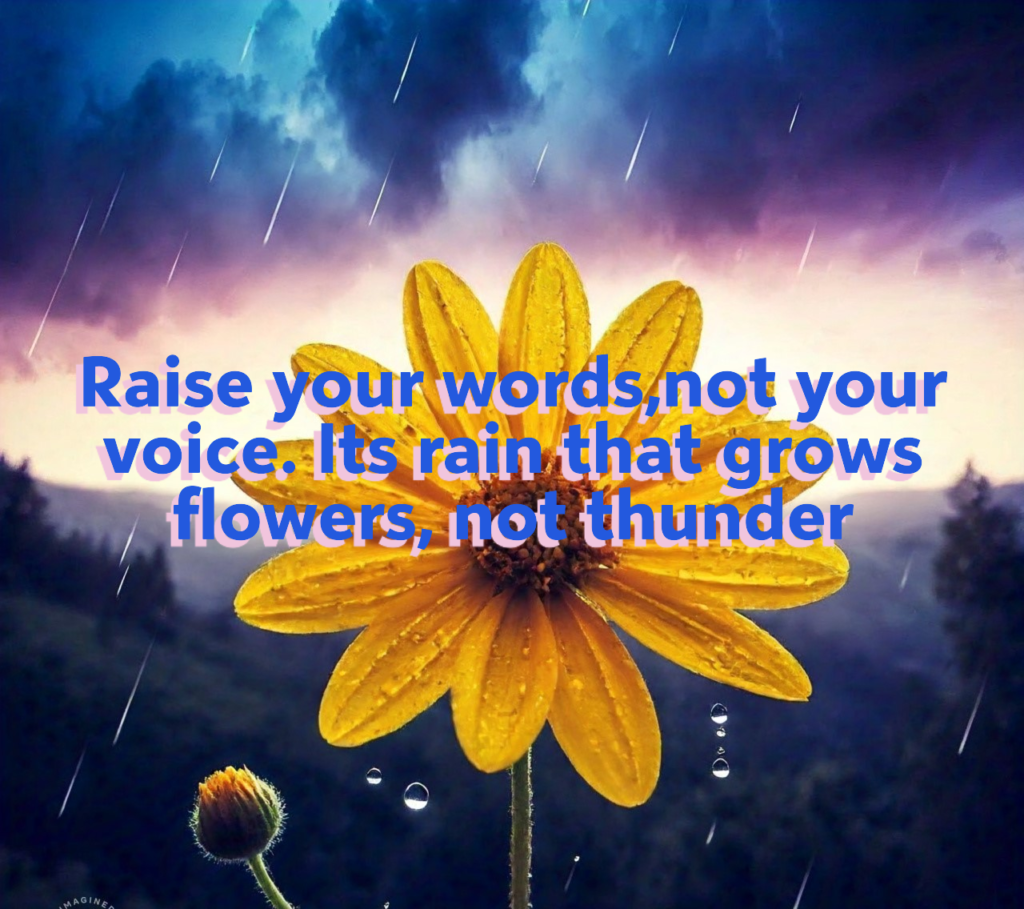Rumi's Wisdom:"Raise Your Words, Not Voice. It is Rain That Grows Flowers, Not Thunder."
"Raise Your Words, Not Voice. It is Rain That Grows Flowers, Not Thunder."
اپنے الفاظ کو بلند کریں، آواز نہیں۔ یہ بارش ہے جو پھول اگاتی ہے گرج نہیں
Rumi's quote, "Raise your words, not voice. It is rain that grows flowers, not thunder," highlights the importance of using gentle and constructive communication rather than resorting to loud or aggressive tones.
 Raise Your Words, Not Voice. It is Rain That Grows Flowers, Not Thunder.
Raise Your Words, Not Voice. It is Rain That Grows Flowers, Not Thunder.رومی کا اقتباس، "اپنے الفاظ کو بلند کرو، آواز نہیں، یہ بارش ہے جو پھول اگاتی ہے، گرج نہیں،" بلند آواز یا جارحانہ لہجے کا سہارا لینے کے بجائے نرم اور تعمیری بات چیت کے استعمال کی اہمیت کو اجاگر کرتا ہے۔
This quote suggests that true influence and growth come from calm and thoughtful expression. Just as rain nurtures and helps flowers to bloom, kind and considerate words can foster understanding and positive change. On the other hand, thunder, though loud and attention-grabbing, does not contribute to growth.
In the same way, raising one's voice or using harsh words may attract attention temporarily, but it rarely leads to meaningful or lasting progress. Therefore, Rumi encourages us to communicate with wisdom and compassion, as these are the tools that truly make a difference.
یہ اقتباس بتاتا ہے کہ حقیقی اثر و رسوخ اور ترقی پرسکون اور سوچے سمجھے اظہار سے آتی ہے۔ جس طرح بارش پھولوں کی پرورش اور کھلنے میں مدد کرتی ہے، اسی طرح مہربان اور قابل غور الفاظ سمجھ اور مثبت تبدیلی کو فروغ دے سکتے ہیں۔ دوسری طرف، گرج، اگرچہ اونچی آواز میں اور توجہ دلانے والی، ترقی میں حصہ نہیں ڈالتی۔
اسی طرح، کسی کی آواز بلند کرنا یا سخت الفاظ کا استعمال وقتی طور پر توجہ مبذول کر سکتا ہے، لیکن یہ شاذ و نادر ہی بامعنی یا دیرپا ترقی کا باعث بنتا ہے۔ لہٰذا، رومی ہمیں حکمت اور ہمدردی کے ساتھ بات چیت کرنے کی ترغیب دیتا ہے، کیونکہ یہی وہ اوزار ہیں جو واقعی فرق پیدا کرتے ہیں۔
Rumi's works are widely read today in their original language across Greater Iran and the Persian-speaking world.[23][24] His poems have subsequently been translated into many of the world's languages and transposed into various formats. Rumi has been described as the "most popular poet",[25] is very popular in Turkey, Azerbaijan and South Asia,[26] and has become the "best-selling poet" in the United States.[27][28]
رومی کی تخلیقات آج بڑے پیمانے پر ایران اور فارسی بولنے والی دنیا میں ان کی اصل زبان میں پڑھی جاتی ہیں۔[23][24] ان کی نظموں کا بعد میں دنیا کی کئی زبانوں میں ترجمہ کیا گیا اور مختلف شکلوں میں منتقل کیا گیا۔ رومی کو "سب سے زیادہ مقبول شاعر" کے طور پر بیان کیا گیا ہے،[25] ترکی، آذربائیجان اور جنوبی ایشیا میں بہت مقبول ہے،[26] اور امریکہ میں "سب سے زیادہ فروخت ہونے والا شاعر" بن گیا ہے۔[27][28]
ناشتہ 24/25: آپ کا دن کا سب سے اہم کھان

Comments
Post a Comment